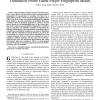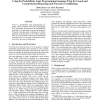1300 search results - page 5 / 260 » Probabilistic logic with independence |
TCIAIG
2010
13 years 3 months ago
2010
Abstract--Fingerprinting operators generate functional signatures of game players and are useful for their automated analysis independent of representation or encoding. The theory ...
ICML
2005
IEEE
14 years 9 months ago
2005
IEEE
Many real-world domains exhibit rich relational structure and stochasticity and motivate the development of models that combine predicate logic with probabilities. These models de...
LPAR
2010
Springer
13 years 7 months ago
2010
Springer
Abstract. The paper presents the methodology and the results of checking consistency of the knowledge base of CADIAG-2, a large-scale medical expert system. Such knowledge base con...
IJCAI
2007
13 years 10 months ago
2007
P-log is a probabilistic logic programming language, which combines both logic programming style knowledge representation and probabilistic reasoning. In earlier papers various ad...
IGPL
2008
13 years 8 months ago
2008
We show that IPC, K4, GL, and S4, as well as all logics inheriting their admissible rules, have independent bases of admissible rules. Key words: admissible rule, independent basi...


